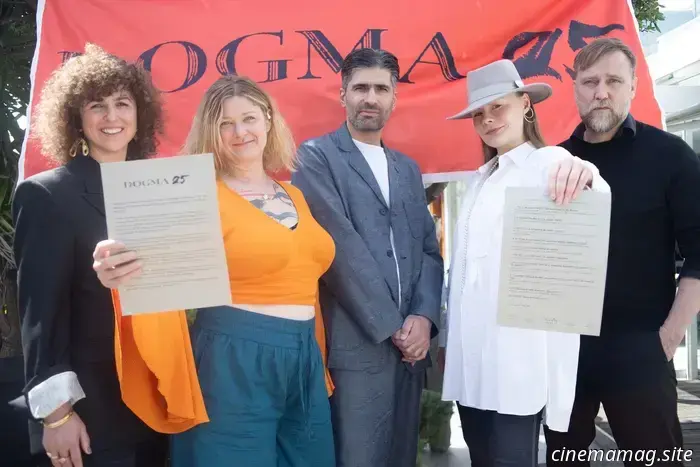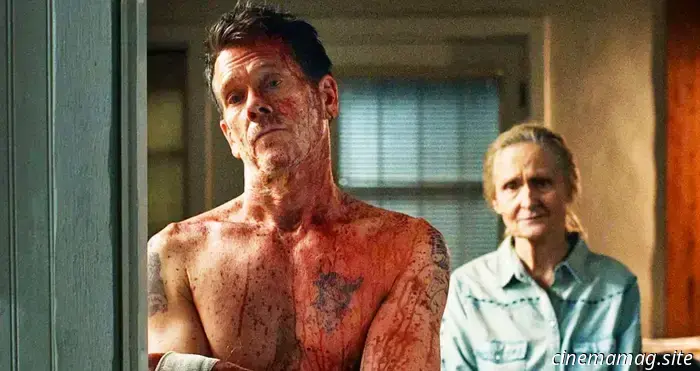
The Dogma 25 Movement is launched three decades after the inception of Dogme 95 by Lars von Trier and Thomas Vinterberg.
It has now been three decades since Lars von Trier and Thomas Vinterberg introduced the Dogme 95 movement, which presented a series of simplified filmmaking principles aimed at returning power to directors. Although films like Festen, The Idiots, and even Harmony Korine's Julien Donkey-Boy emerged during its peak, the movement faded about ten years later. However, a group of Danish filmmakers has now initiated Dogma 25, their own manifesto.
Founded by May el-Thouky (Queen of Hearts), Milad Alami (The Charmer), Isabella Eklöf (Holiday), Annika Berg (Hurricane), and Jesper Just, this new movement arises at a crucial moment as the industry faces numerous challenges. "We honor Dogma 95, the filmmakers who paved the way for us, and those yet to come. United, we defend artistic freedom as a bulwark against meaninglessness and helplessness. Dogma 25 signifies a rescue mission and a cultural uprising," the filmmakers declared. "In an era where formulaic films shaped by algorithms and artificial aesthetics are on the rise, our aim is to advocate for the flawed, unique, and human touch. We promote the uncompromising and unpredictable, resisting efforts to reduce cinematic art to an ultra-processed commodity."
In a statement made at Cannes Film Festival in Zentropa’s villa, Lars von Trier and Thomas Vinterberg remarked, "In '95, we created films with a sense of security and launched a rebellion against conformity. In '25, new dogmas are forming in a world filled with conflict and uncertainty. We wish you the best in your effort to reclaim Danish cinema."
With hopes for each of the five directors to complete a feature film within the next three years, they have already secured around $1.5 million for each project. As we await further developments, you can read their manifesto below.
Dogma 25 is a group of filmmakers established in Copenhagen during the spring of 2025. Our stated goal is to maintain the originality of cinema and the ability to create films on our own terms.
The role of the director has increasingly become that of a project manager, the film has turned into a product, and the audience has been reduced to consumers. Experimental practices are hindered by the fear of taking risks, which stifles artistic exploration and silences individual voices. When films are merely produced without the opportunity for organic evolution, the art form risks becoming functional, compliant, and ultimately irrelevant.
In a landscape where formulaic films driven by algorithms and artificial visual styles are proliferating, it’s our mission to champion the flawed, distinct, and human essence. We uphold the uncompromising and unpredictable and are committed to fighting against the forces that seek to diminish cinematic art into an over-processed consumer product.
By minimizing production scales, we ensure that every team member has a close connection to the film and its message. This fosters mutual trust and a collective responsibility for the film and each other. It also preserves the flexibility essential for a dynamic and intuitive creative process, rather than a purely executive one.
We celebrate Dogma 95, the filmmakers who have come before us, and those yet to follow. United, we defend artistic freedom as a safeguard against meaninglessness and powerlessness. DOGMA 25 represents a rescue mission and a cultural revolt.
To protect and sustain what we cherish, we hereby commit to an unwavering and indomitable set of rules known as: THE VOW OF CHASTITY.
THE VOW OF CHASTITY
I pledge to adhere to the following set of rules articulated and endorsed by Dogma 25:
1. The script must be original and handwritten by the director.
We obligate ourselves to handwrite the script to cultivate the kind of intuition that arises most freely from the dream, flowing through the hand onto the paper.
2. At least half of the film must have no dialogue.
We advocate for a cinematic approach to filmmaking since we believe in visual storytelling and trust the audience’s intelligence.
3. The internet is off-limits in all creative processes.
We commit to producing films based on real people in our physical reality, rather than in a digital realm governed by algorithms.
4. We will only accept funding with no conditions that alter the content.
We take responsibility for managing the budget so that the team maintains final authority over all artistic choices.
5. No more than 10 individuals will work behind the camera.
We commit to collaborating closely to build trust and enhance our shared vision.
6. The film must be shot in the location where the narrative is set.
Film as an art form becomes artificial and generic when we depict a place inaccurately.
7. We are not permitted to use makeup or alter faces and bodies unless it serves the narrative.
Just as we aim to uphold the authenticity of the location, we also desire to portray the human body without filters. We embrace it—imperfections included.
8. All production-related items must

Другие статьи
 Hiya Toys has released the Mecha King Ghidorah figure from the Exquisite Basic Series, based on Godzilla vs. King Ghidorah.
Hiya Toys has announced the Exquisite Basic Series Mecha King Ghidorah action figure from the 18th installment of Toho’s Godzilla series, Godzilla vs. King Ghidorah. It is currently available for pre-order at a price of $120; check it out here… The newest addition to the Classic Godzilla line! Now featuring Mecha King Ghidorah from Godzilla vs. King Ghidorah (1991) […]
Hiya Toys has released the Mecha King Ghidorah figure from the Exquisite Basic Series, based on Godzilla vs. King Ghidorah.
Hiya Toys has announced the Exquisite Basic Series Mecha King Ghidorah action figure from the 18th installment of Toho’s Godzilla series, Godzilla vs. King Ghidorah. It is currently available for pre-order at a price of $120; check it out here… The newest addition to the Classic Godzilla line! Now featuring Mecha King Ghidorah from Godzilla vs. King Ghidorah (1991) […]
 Cannes Review: Pillion is a Thought-Provoking, Humorous, and Moving Anti-Romance
Cannes wouldn’t be complete without an intriguing scandal film. For 2025, British filmmaker Harry Lighton’s feature debut Pillion might be the one to leave the most viewers shocked. Focused on a dom-sub relationship in the gay biker community, it showcases scenes of fetishistic sexual acts that could provoke strong reactions from more sensitive viewers. It
Cannes Review: Pillion is a Thought-Provoking, Humorous, and Moving Anti-Romance
Cannes wouldn’t be complete without an intriguing scandal film. For 2025, British filmmaker Harry Lighton’s feature debut Pillion might be the one to leave the most viewers shocked. Focused on a dom-sub relationship in the gay biker community, it showcases scenes of fetishistic sexual acts that could provoke strong reactions from more sensitive viewers. It
 First Teaser Trailer for Julia Ducournau’s Alpha, Scheduled for Release in October 2025
Scheduled for its world premiere at the Cannes Film Festival today, Alpha places Julia Ducournau in the challenging position of succeeding 2021's Palme d'Or winner, Titane. Featuring Mélissa Boros, Golshifteh Farahani, Tahar Rahim, Emma Mackey, and Finnegan Oldfield, the film has released its first teaser in anticipation of NEON's theatrical launch in October 2025. Here’s a short synopsis:
First Teaser Trailer for Julia Ducournau’s Alpha, Scheduled for Release in October 2025
Scheduled for its world premiere at the Cannes Film Festival today, Alpha places Julia Ducournau in the challenging position of succeeding 2021's Palme d'Or winner, Titane. Featuring Mélissa Boros, Golshifteh Farahani, Tahar Rahim, Emma Mackey, and Finnegan Oldfield, the film has released its first teaser in anticipation of NEON's theatrical launch in October 2025. Here’s a short synopsis:
 Amazon has decided to terminate the Kevin Bacon series The Bondsman after just one season.
Amazon has canceled The Bondsman, as Variety has reported that the streaming giant has decided not to renew the Kevin Bacon-led action horror series for a second season. The show premiered last month, featuring Bacon as Hub Halloran, a bounty hunter who is killed and given a second chance at life.
Amazon has decided to terminate the Kevin Bacon series The Bondsman after just one season.
Amazon has canceled The Bondsman, as Variety has reported that the streaming giant has decided not to renew the Kevin Bacon-led action horror series for a second season. The show premiered last month, featuring Bacon as Hub Halloran, a bounty hunter who is killed and given a second chance at life.
 Titan Comics reveals collections of Blade Runner omnibus.
Titan Comics and Alcon Entertainment have revealed that they will be compiling their 'Ash saga' of Blade Runner comic titles – Blade Runner 2019, Blade Runner 2029, and Blade Runner 2039 – into three deluxe omnibus editions that are scheduled for release later this year. The series is penned by Michael Green, who was the screenwriter for the Blade Runner 2049 film, with […]
Titan Comics reveals collections of Blade Runner omnibus.
Titan Comics and Alcon Entertainment have revealed that they will be compiling their 'Ash saga' of Blade Runner comic titles – Blade Runner 2019, Blade Runner 2029, and Blade Runner 2039 – into three deluxe omnibus editions that are scheduled for release later this year. The series is penned by Michael Green, who was the screenwriter for the Blade Runner 2049 film, with […]
-Movie-Review.jpg) The Phoenician Scheme (2025) - Film Review
The Phoenician Scheme, 2025. Created and helmed by Wes Anderson. Featuring performances by Benicio del Toro, Mia Threapleton, Michael Cera, Riz Ahmed, Tom Hanks, Bryan Cranston, Mathieu Amalric, Richard Ayoade, Jeffrey Wright, Scarlett Johansson, Benedict Cumberbatch, Rupert Friend, Hope Davis, Bill Murray, Charlotte Gainsbourg, Willem Dafoe, and F. Murray Abraham. SYNOPSIS: The tale revolves around a family and […]
The Phoenician Scheme (2025) - Film Review
The Phoenician Scheme, 2025. Created and helmed by Wes Anderson. Featuring performances by Benicio del Toro, Mia Threapleton, Michael Cera, Riz Ahmed, Tom Hanks, Bryan Cranston, Mathieu Amalric, Richard Ayoade, Jeffrey Wright, Scarlett Johansson, Benedict Cumberbatch, Rupert Friend, Hope Davis, Bill Murray, Charlotte Gainsbourg, Willem Dafoe, and F. Murray Abraham. SYNOPSIS: The tale revolves around a family and […]
The Dogma 25 Movement is launched three decades after the inception of Dogme 95 by Lars von Trier and Thomas Vinterberg.
It's been three decades since Lars von Trier and Thomas Vinterberg initiated the Dogme 95 movement, which established a series of minimalist filmmaking guidelines aimed at returning authority to directors. Although films like Festen, The Idiots, and Harmony Korine's Julien Donkey-Boy were created during this period, the movement eventually faded away after roughly ten years.
